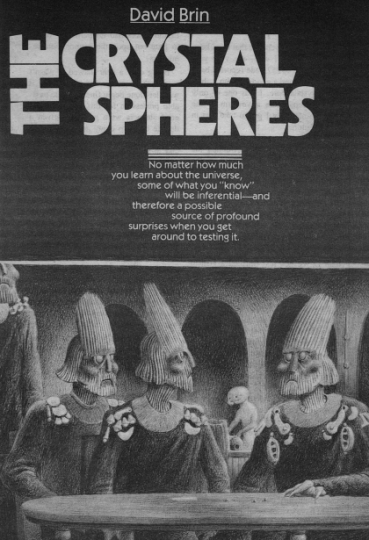Kris:
Much like the characters in the story I think I understand what is going on, but I am not sure if I understand the why…
It seems to be an answer to the Fermi Paradox based around solar systems being kept inside impenetrable Ptolemaic-esque spheres. It has some interesting language and a nice melancholic atmosphere, in the end coming down on a slightly cynical view of intelligences
However, I am not sure what it all means. It comes across as bizarre but I don’t think it is meant to be so just for the sake of it. The ending in particular seems to be confusing to me, that a timeless existence in a black hole is more preferable than living in hope of a new breakout and being able to aid that civilization in the ice comet battles. (On that point, if these kind of eggs were designed in some way, why would it be made that the species are going to have to battle for their lives.
I feel like I am missing a big point. Can anyone illuminate?
Brian
Even after a second reading I feel I may be too stupid to understand what’s going on here. I understand the broad strokes of it, and cross-referencing my experience with the Wikipedia synopsis helped, but even then…
In one of those weird little coincidences this is one of two consecutive Hugo-winning short stories to tackle the Fermi paradox, the other being Fred Pohl’s “Fermi and Frost.” Very different stories, though even more weirdly they both have to do with ice. But Brin’s is much closer to a space exploration narrative in the Canpbellian fashion, only cloaked in obtrusive language that arguably distracts from the narrative more than adds to it. The narrator is clearly meant to be a spacer who, thanks largely to cold sleep, has lived for centuries and is thus out of sync with what’s happening currently, but the jargon at times sounds redundantly constructed. For instance, he’ll use a combo of two words that mean basically the same thing, which again distracted me.
I’ve said before and I don’t wanna repeat myself (although as far as readers are concerned this is my first time bringing it up), but I genuinely have to wonder if Brin had read Greg Bear’s “Hardfought” and was inspired to try a similar experiment with how English might change or be perverted over time, only the linguistic trickery of “Hardfought” was more inventive and we were given much more time to become acclimated with how these far-future people act and speak. With “The Crystal Spheres” I was confused, but like with a weed high gone amiss I felt vaguely disturbed rather than enlightened. I normally like Brin from this era, Startide Rising and The Uplift War being formative SF novels for me, but I have to admit this one perplexes me, and not in a good way exactly.
Mikayla:
I really disliked the narration style of this story, particularly the stuck together pairs of words. I’m assuming they were an attempt to try to show language shifting? But they were just really annoying.
Through the beginning/middle of this story it was feeling very uncomfortably pro-colonialism, and that humanity is horribly sad if they can’t colonize everything that we can see, but then it kind of turned and pointed out that this drive for colonialism destroys other cultures. Which is a good point, and more awareness than I expected from how the story had been going, but I’m not sure why that leads to civilizations inevitably going into stasis around a black hole.
I’m very unclear if the way this universe is set up is supposed to imply that the protection around each solar system is naturally occurring or some kind of designed system. It being naturally occurring seems improbable, and if it was designed, it was very badly designed since it does a lot of damage to the emerging civilization it was protecting when it breaks.
There are some possibly interesting ideas here, even if I’m not sure I follow their logic, but I never would have gotten far enough in the story to read them if I wasn’t reading them for this project. Most of them come right at the end and I was ready to give up in annoyance over the narration by the end of the second paragraph.
I’m curious if the author wrote anything else in this setting, because it feels like there was an excessive amount of world building here that wasn’t necessarily relevant to the story being told.


